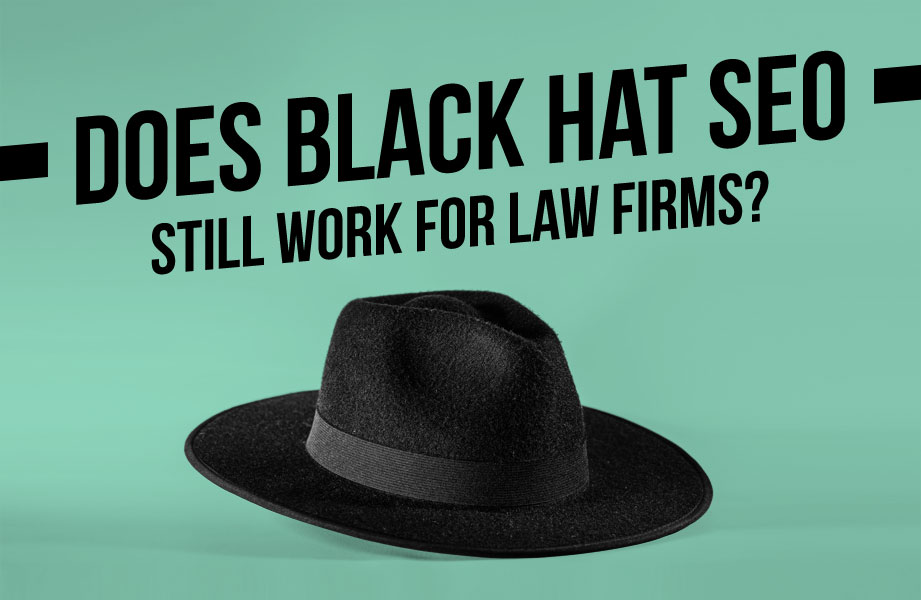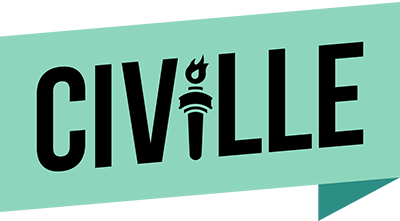
There are a lot of law firm websites out there in the wild and some of them do some strange things in order to get traffic. We are referring to the nefarious practice of black hat SEO. Does black hat SEO still work for law firms? The quick answer is no. No, it does not. Learn what black hat SEO practices are out there, how they work, why they are bad, and if your website or SEO provider is potentially indulging in any of these bad practices on your behalf.
What Does Black-Hat SEO Mean?
People might attribute the phrase black hat to hacker culture, but really it comes from old westerns where the good guy often wore a white hat and the bad guy wore a black hat. Regardless, the phrase is much more synonymous with hacking and cyber security today.
In hacking circles, a white hat hacker hacks for the purposes of good. Generally, they draw attention to systems that are in need of repair. They often conduct their work with the permission of the system owner.
Not only do black hat hackers operate without permission, but they also do so with nefarious intentions often to their own benefit. Selling personal information or corporate secrets is commonplace in these communities.
How Does Black Hat SEO work?
Black hat SEO is often not expressly illegal, though it can sometimes operate in a legal gray area. Essentially, black hat SEO is any practice designed to bring more traffic to your site without actually providing better value to the searcher.
More Traffic is Always Better Right?
Strictly speaking, more traffic is a good thing. Even if you are attracting clients and customers that aren’t interested in your services, by attracting more people, and widening your net, you are more likely to get clients that are interested.
This is where numbers can get confusing. Having way more traffic will mean a lower conversion rate, but here it’s important to look at total conversions and not the rate. If your traffic doubles, but your conversions go up by 25%, your conversion rate goes down, but you are actually making more money.
Does Black Hat SEO Actually Earn More Traffic?
If we look back a decade or two ago, when many black hat SEO practices were born, you’ll find that many of these strategies (which we will get into in a moment) were huge traffic earners. Not only were they big earners, but they were widely used across the web.
Eventually, slowly, that all changed. Not only were the old tricks no longer working. They were having the opposite effect. If two pages with similar content, quality, and domain authority compete for the same topic, the one that is using black hat SEO practices would have a hard time ranking at all.
So what happened? Google happened. Google and the other search engines recognized these practices, saw the negative effect that they were having on quality search results, and instead of just ignoring the black hat SEO practices, they penalized them. These days, all but the most subtle black hat SEO practices will cause more harm than good, and utilizing any of those practices is just asking for trouble.
Five Scary Things Law Firms Do in Digital
What Types of Black Hat SEO Are There
There are a ton of black hat SEO strategies, but most of them fall into the camps that we have listed below. There is some overlap, and some more niche strategies that we will not get into here, but this is the bulk of them.
Keyword Stuffing
This is the most well-known form of black hat SEO. Keyword stuffing is often easily recognized by any searcher, and it’s also easily identified by search engines. Good content has good keyword usage all throughout. Often it’s the subtle art of including keywords naturally in the flow of writing.
It could be something as simple as “Uncontested divorces differ from contested divorce in that…” as opposed to “Uncontested divorces are different because…” The first example contains a strong long-tail keyword in the text even if it’s not your main keyword. Writing this way isn’t dishonest, but instead, more clearly states intent.
On the other side is where we get to actual keyword stuffing. This is including keywords that have little or nothing to do with the topic of the page. Often these keywords aren’t even written into sentences. Instead, they are pushed together in a paragraph that makes little sense.
Link Buying
Is someone asking to pay you for a link? Are you paying someone else for a link? Is it legal? Yes. Should you do it? No! Getting links on other websites is a great way to boost your overall rankings as it adds authority to your domain. How you go about getting those links though is important.
Google often works in mysterious ways, and algorithmically, it is pretty good at tracking down paid links especially when they are from a link farm. What’s a link farm? It’s a place where many paid links live.
Do you want links to your site on other sites without paying for them? Make sure you are listed on review sites and don’t hesitate to do interviews or collaborations. You can even reach out to other nearby law firms to see if you can swap links if you don’t overlap in your practice areas. Buying and selling links is frowned upon, but trading links is part of how the Internet works.

Cloaking
One of the tricky things black-hat SEO “experts” can do is serve a different piece of content to a user than they serve to a search engine. This can even be done in conjunction with keyword stuffing so that the end-user never sees your keyword stuffing ways.
Seems like a brilliant trick right? Problem is that a search engine can usually see through these tricks. If you think requesting that a search engine only partially crawls your site will help, think again. It’s a not-so-secret secret that Google will crawl anything it can find. If it’s linked on your website or anywhere else on the crawlable Internet, Google will find it. The search engine may not rank it, but it will know that it exists.
Comment Spam
Do you have a blog with a comments section? You have two options if you do. Either moderate every single comment or turn comments off entirely. Black hat SEO “experts” love a blog that they can comment on. Why? Because it lets them throw links in there.
Many of these comments are silly at best, but some can even appear real and will often hide a link deep into their response, or include it under the pretense of being helpful to the conversation. These links can make your humble website look like a link farm and hurt your rankings. Don’t trust someone who wants to do this for you, and don’t become the unwilling pawn in someone else’s black hat strategy. Moderate or disable those comments.
Content Theft
It’s easy to fall into the trap of needing more content and going for an easy way out. There are many sites out there that will provide template content or even scrape (i.e. steal) content from other websites.
We’ve encountered it ourselves with other websites stealing content that we’ve written. Not only can this hurt your website, but it can also hurt the website that you stole it from. That’s why, at Civille, we only ever write completely custom content for all the marketing services we provide. If you encounter someone stealing from your site, then you probably already know how much a strongly worded letter with the threat of legal action can do.

Structured Data Abuse
There’s a thing called scheme or structured data. We’ve written about schema before, but the high-level view of it is that structured data like schema is a way to show a search engine how content on a page fits together. A common schema is a recipe, and when used correctly, a search engine will be able to see things such as how long it takes, nutrition information, ingredients, steps, and more with absolute clarity.
Sound’s good right? It very much is, and you should be using schemas on your law firm’s website. But it can also be used negatively. A common trick is to use the review schema to give yourself 5-star reviews that could populate in search. Again, this is something you should not do. If you get found out or reported—which Google makes very easy for a user to do—you are not going to like the results.
Read more: How to Get More Google Reviews for Your Law Firm
Redirects
Redirects are standard practice. If you are switching web providers, changing URLs, or removing old or outdated parts of your website, it’s natural to redirect that traffic to the relevant pages that are still on your website.
Black hat SEO “experts” will use this similarly to cloaking where they redirect from a high-ranking page to an unrelated page to give that latter page a performance boost. Search engines can see what you are doing, and if they detect a disconnect in how you are using redirects, you will be penalized for it.
Should You Use Black Hat SEO Strategies on Your Law Firm’s Website?
In case it wasn’t obvious already, you should absolutely not use black hat SEO strategies to improve your rankings. At best, you will get a temporary boost in traffic, at worst, you will tumble from search results pages and end up with less traffic than when you started.
At Civille, we know the secret to getting more traffic, and it doesn’t rely on black hat strategies. The secret is fast site speed, an optimized platform, a solid website structure, and well-written custom content that’s relevant to what your law firm does and what your clients and potential clients are looking for. Contact us for a free website review today!





